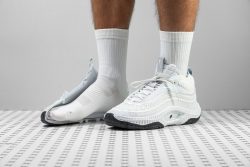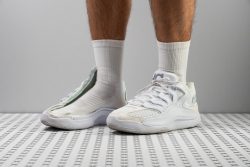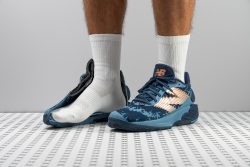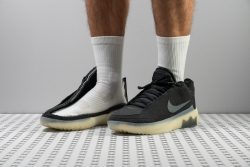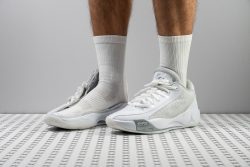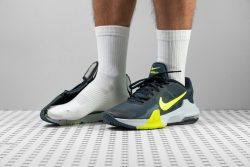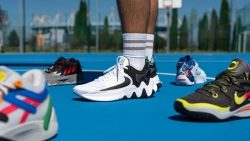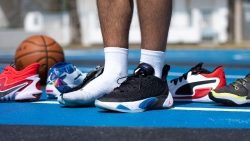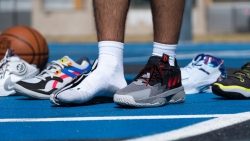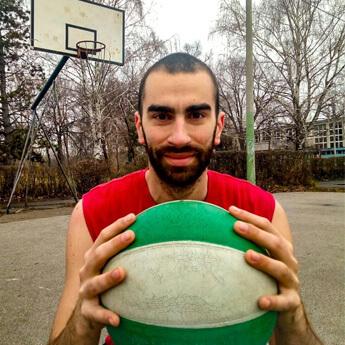6 Best Outdoor Basketball Shoes in 2025
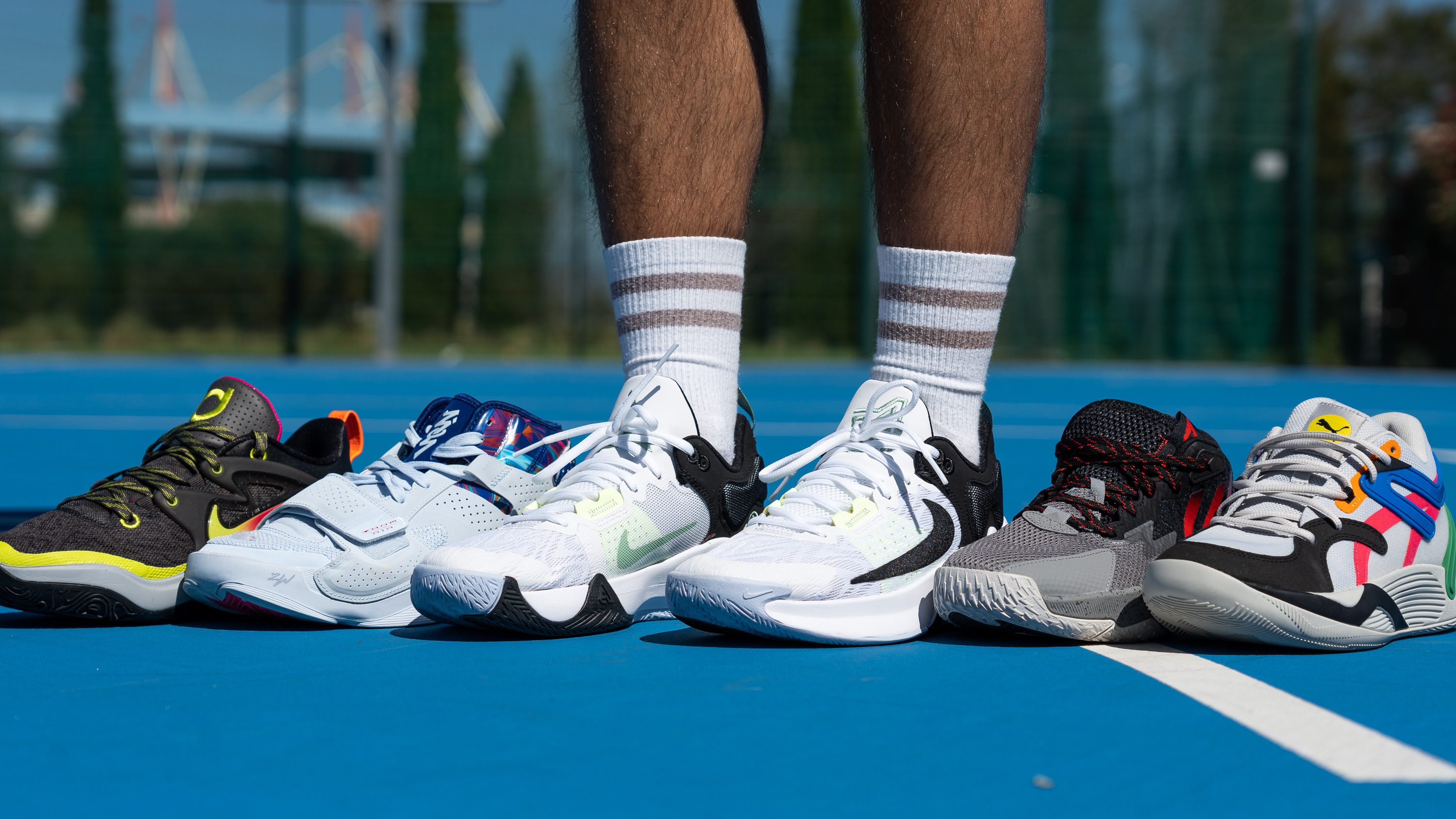
We buy shoes ourselves. We earn commissions when you buy through us, at no extra cost. Why trust us
Basketball is largely an indoor sport. Officially, it is played on well-maintained hardwood courts, which is why brands primarily design basketball shoes for indoor use.
With that, we consider it a huge plus when we find out that a shoe is actually good for outdoor courts. This only means that the manufacturer went out of their way to add more durability to the shoe.
In this guide, we present shoes that we found to be most suitable for harsher outdoor conditions. Our top picks are based on both playtesting these basketball shoes on the blacktop and measuring dozens of parameters in our shoe lab.
How we test outdoor basketball shoes
To keep our opinions on basketball footwear as objective as possible, we do the following:
- Steer clear from sponsorships. While freebies are nice to have, we don't want them to color our judgments. We see it fit to purchase the outdoor basketball shoes using our own cash.
- Test the shoes on outdoor courts. We make sure to do it on surfaces that are typical of outdoor courts: rough, dusty, and made of solid concrete with asphalt on top.
- In addition to our qualitative descriptions, we also cut the shoes in half to perform lab tests on them. We then publish the results in our in-depth reviews and make them comparable across all basketball shoes.
Best outdoor basketball shoes overall
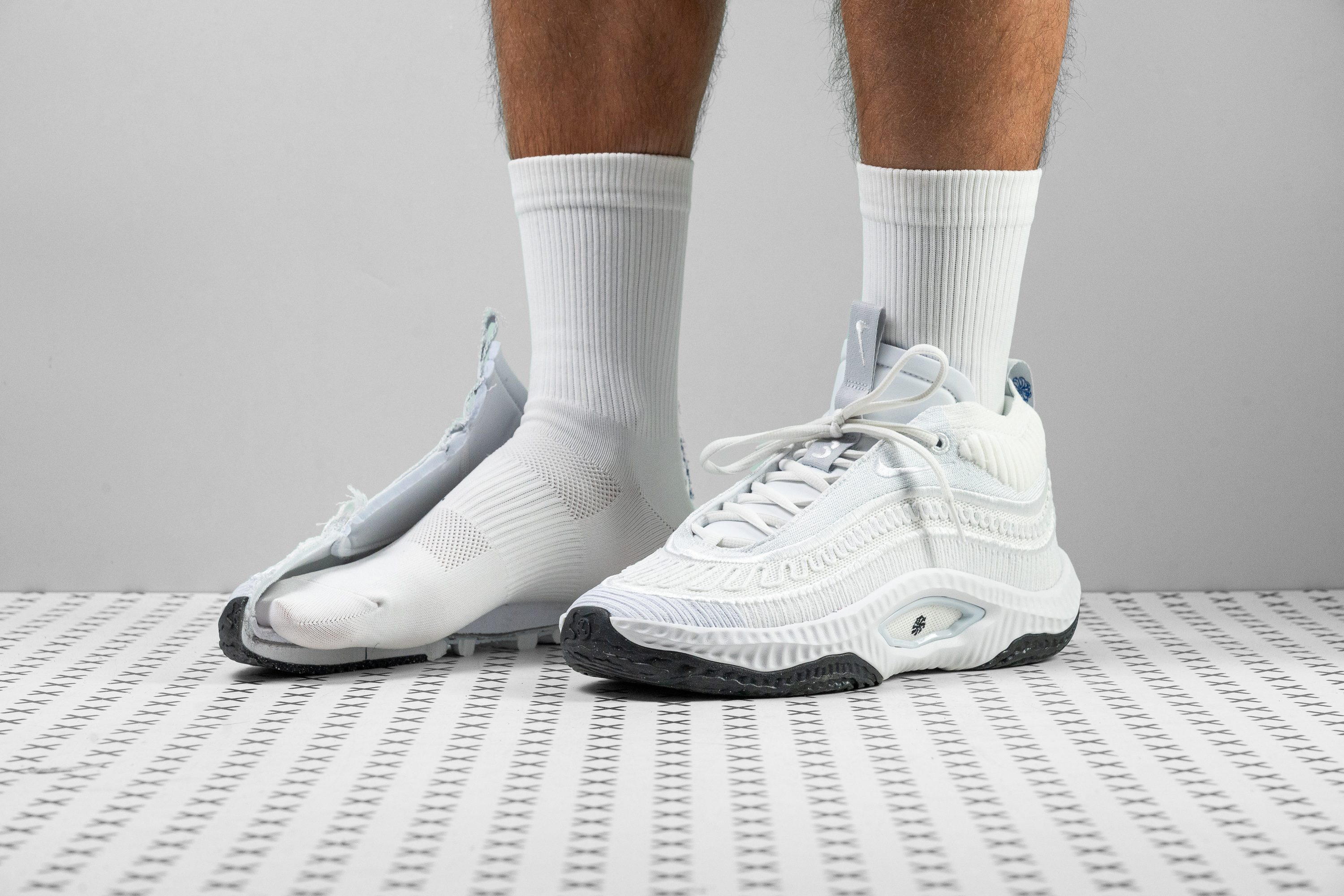












































What makes it the best?
We say that the Nike Cosmic Unity 3 is currently the best for outdoor hooping because of its durable outsole, low-to-the-ground profile, and immense foot containment capacities. Because of all these benefits, we felt not only protected but also well-supported and much more in control.
While the outsole rubber (3.5 mm) is not really thicker than the average (4.1 mm), our lab assessments revealed that the sole of the Cosmic Unity 3 is actually harder. It registered 86.5 on the HC durometer, while the average is only at 81.5. Based on our experience, harder rubbers last longer outdoors!
Court feel was also something that we didn’t have issues with. In fact, we had so much of it; it’s crazy! The heel and forefoot are only 27.9 mm and 20.7 mm high, or 2.1 mm and 0.9 mm lower than the typical measurements. These figures do not sound much, but when coupled with the midsole’s firmness as gauged by our HA durometer (33.3 vs 26.6 average), they translated to much more pronounced ground feedback, which in turn allowed us to be more confident with our steps.
In the lab, we also manually twisted, pushed, and pulled on this shoe to teach just how resistant it is to force. We gave it a 4 out of 5 for torsional rigidity , while it got a 4 out of 5 for heel counter stiffness. On the court, this meant no ankle rolls and zero heel slippage. We could focus on the game, and our sprints and strides were much more precise and purposeful.
The firm midsole was a two-edged sword. It was not able to deliver that amount of impact protection that we needed. Players who expect pampering from their cushioning systems should look for something else.
Pros
- Perfect for outdoor courts
- Outstandingly durable
- One of the most stable shoes
- Good impact protection and rebound
- Wide platform
- Very secure lockdown
- Breathable enough
- Sustainable materials
Cons
- Subpar traction
- Firm sole with poor impact protection
- Heavier than average
- Break-in needed
Outdoor basketball shoes with the best shock absorption
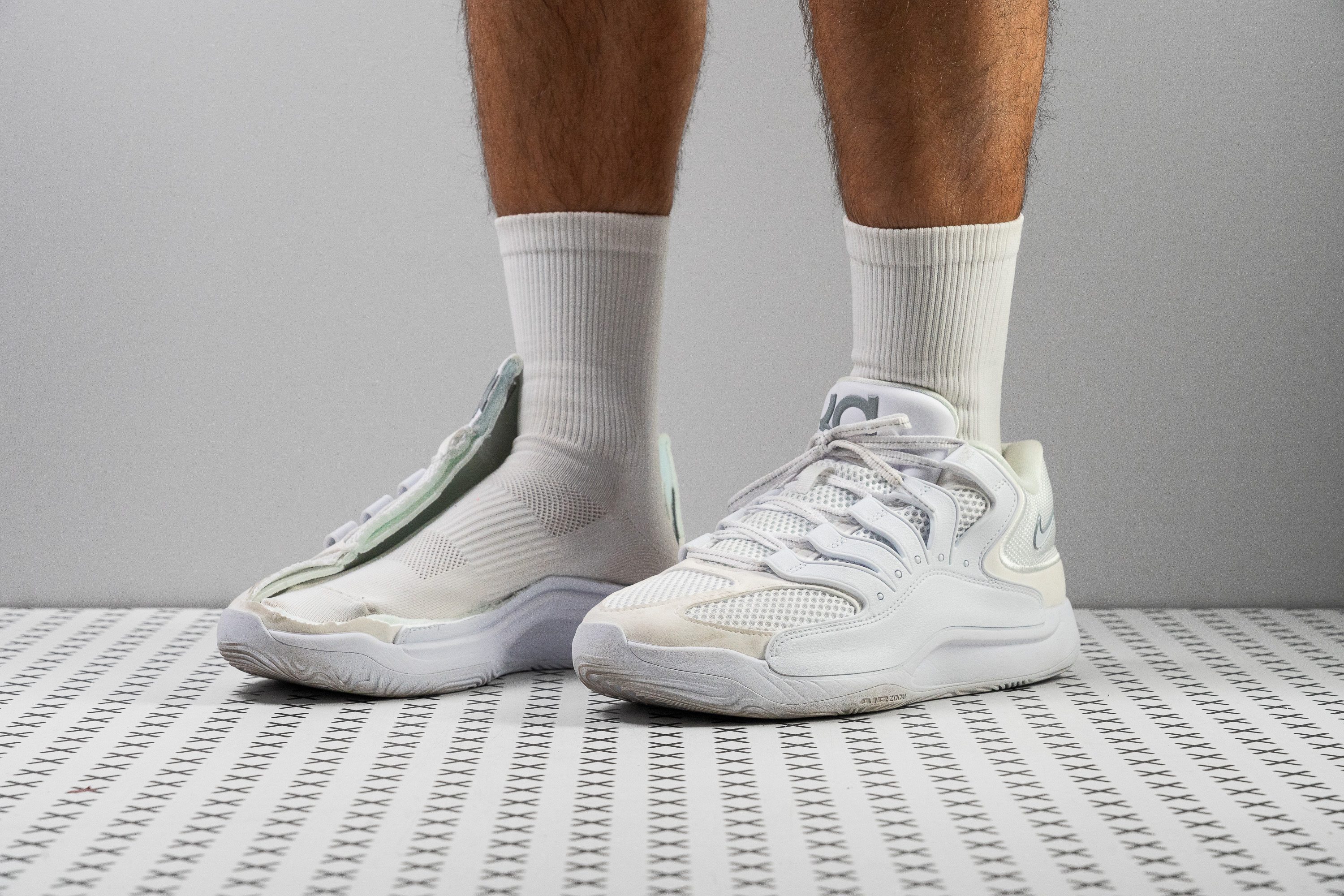











































What makes it the best?
The Nike KD 18’s full-length Cushlon foam, paired with large Air Zoom units, makes pounding on the hard blacktop not only bearable but also enjoyable!
Our lab tests showed particularly high readings both in the shoe’s heel (115 SA) and forefoot (90 SA), making the KD 18 an outdoor basketball shoe with the best shock absorption!
What’s curious is that the shoe provides such a high level of impact protection with a rather moderate stack height of 26.7/21.9 mm. There is no towering slab of foam to mess with our balance! It is a highly stable and supportive kick that locks the foot securely for our dynamic cuts, crossovers, and eurosteps.And the shoe’s impressive friction coefficient of 0.89 makes our streetball sessions even more surefooted in the Nike KD 18!
If only it weighed a little less than 14.9 oz (422g), it would’ve made a perfect all-around basketball shoe!
Pros
- Excellent shock absorption
- Propulsive energy return in the forefoot
- Superb outsole traction
- Solid ankle support and lateral stability
- Secure lockdown and containment
- Comfortable step-in feel
- Good breathability for warm temperatures
- Decent forefoot flexibility
- Promising durability (okay for outdoor courts)
Cons
- Heavier than average
- Not for wide feet
- No major updates from KD 17
Outdoor basketball shoes with the best ankle support
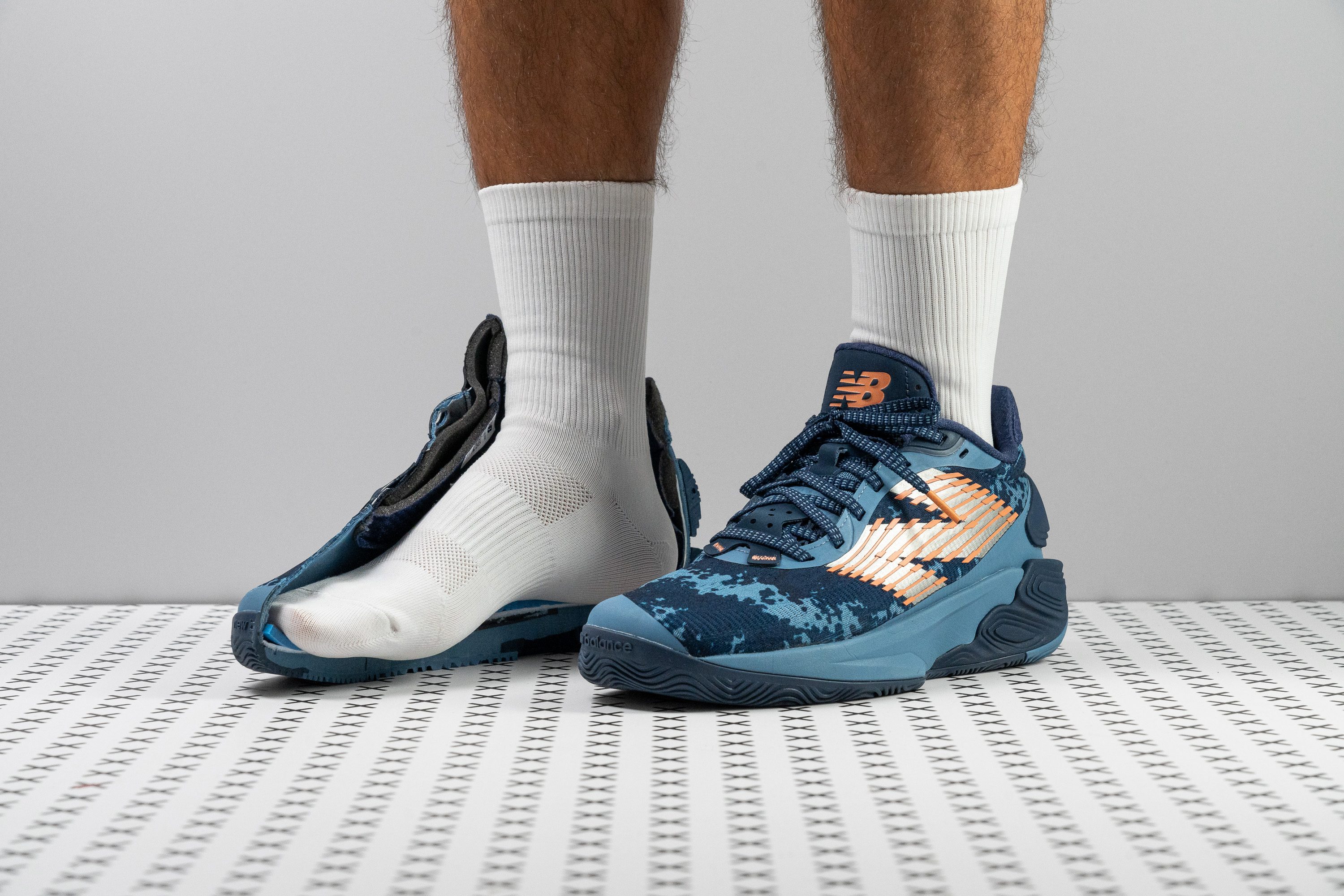



















































What makes it the best?
Rolling your ankle on the blacktop can be way more painful and damaging than on hardwood, and we are glad that shoes like the New Balance TWO WXY V5 can lower that risk! Having thoroughly tested its stability in our lab, we can confirm that it has the best ankle support among outdoor basketball shoes!
First of all, this NB shoe’s high torsional rigidity makes it practically impossible to twist. Its sturdy midsole cradle wraps around the foot from the bottom and extends high up to cover our heels and ankles. The added tough rubber overlays at the back also work together with the shoe’s stiff heel counter and raised collar edges to cement our entire rearfoot in place!
Never once did we experience any undue wobbling or shifting inside the TWO WXY V5!
Not to mention the broad landing area offered by this shoe’s wide platform! Our caliper recorded above-average readings in both the widest part of its forefoot (116.6 mm) and heel (94.6 mm)!
All of this, paired with this New Balance shoe’s solid outsole durability and traction, boosted our confidence on tough outdoor courts every time!
Pros
- Wonderful foot containment and lateral stability
- Excellent shock absorption
- Very supportive underfoot
- Comfortable and soft
- Okay to play streetball from time to time
- Super versatile
- Wide and stable platform
- Optimal and consistent traction
Cons
- Might need a break-in period
- No court feel
- Not many updates from v4
Outdoor basketball shoes with the best traction
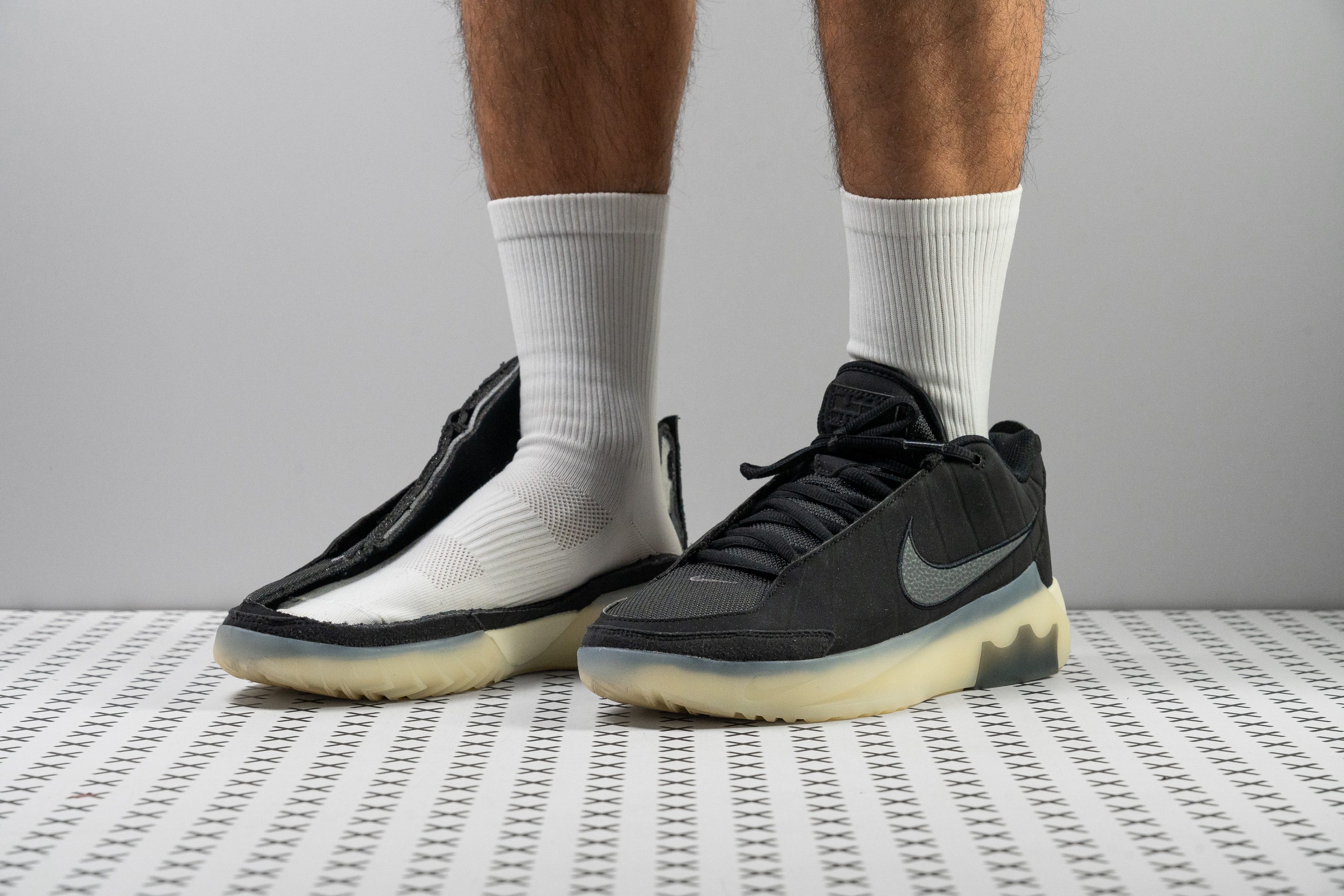












































What makes it the best?
Just by looking at the bottom of the Nike LeBron Witness 9, you can guess that its chunky herringbone tread pattern is ready for more than just hardwood! And when we measured its friction coefficient at an extraordinary 0.84, we had no further doubts that this outdoor basketball shoe has the best outsole traction in town!
But not all grippy outsoles can withstand the abrasion of blacktop, so we tested this Nike shoe’s limits with a Dremel. With a very shallow 0.6 mm dent and an above-average outsole thickness of 4.4 mm, we can rest assured that the LeBron Witness 9 will pass the test!
What’s more, the shoe’s upper materials proved ready for serious wear and tear, earning a high durability score of 4/5!
Believe it or not, but we get to enjoy all these benefits at a very moderate retail price of $105! The only caveat is that this grippy and durable kick has a hefty weight of 15.1 oz (428g).
Pros
- Responsive ReactX midsole
- Excellent stability and ankle support
- Fantastic outsole grip
- Soft comfortable step-in feel
- Accommodating fit
- Great for outdoor courts
- Amazing durability for money
Cons
- Heavier than average
- Not breathable
- Cheap-feeling materials
Best lightweight outdoor basketball shoes
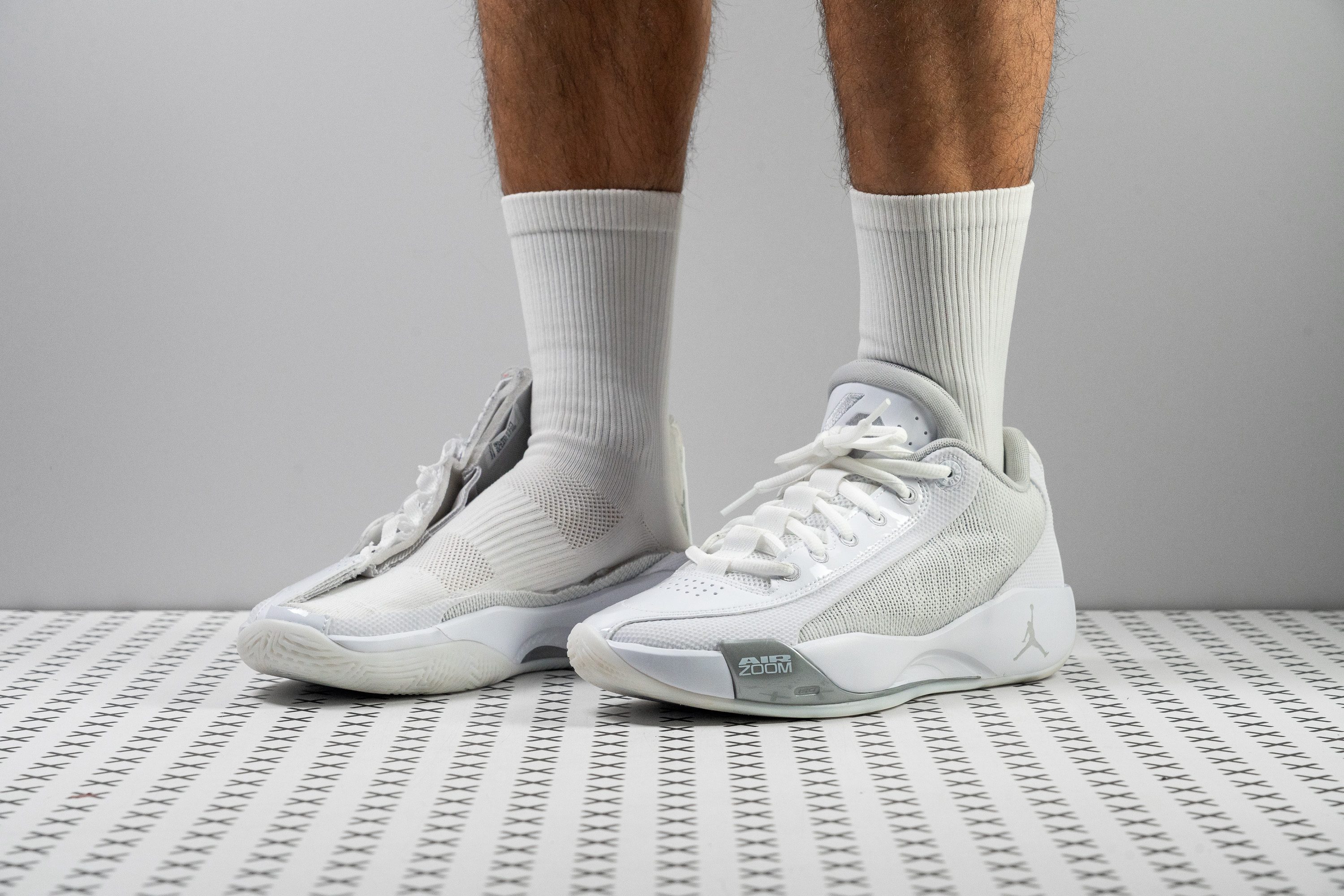













































What makes it the best?
A blacktop-ready shoe that weighs less than average? Yes, that’s the Jordan Luka .77! At only 12.3 oz (349g), it proved to be the best lightweight basketball shoe for outdoor courts!
This Jordan kick proved that higher durability doesn’t necessarily come with extra weight or cost. Our aggressive Dremel test left a barely noticeable 0.4 mm dent in the shoe’s outsole, which is particularly impressive given its budget price of $105!
And it’s not just the Luka .77’s outsole that can survive long hours on asphalt and concrete! Its upper materials also demonstrated fantastic abrasion resistance, earning a high score of 4/5!
Not to mention the shoe’s mighty traction! With some of the highest friction scores of 0.83, this Jordan shoe can also compete for the title of the grippiest outdoor shoe!
Pros
- Amazing durability for outdoor courts
- Exceptional outsole traction
- Pronounced court feel
- Lightweight for its design
- Surprisingly good lateral support
- Above-average breathability
- True to medium width
- Fantastic value for money
Cons
- Low shock absorption
- Uninspiring energy return
- Firm underfoot experience
- Very low toebox height
Best budget outdoor basketball shoes
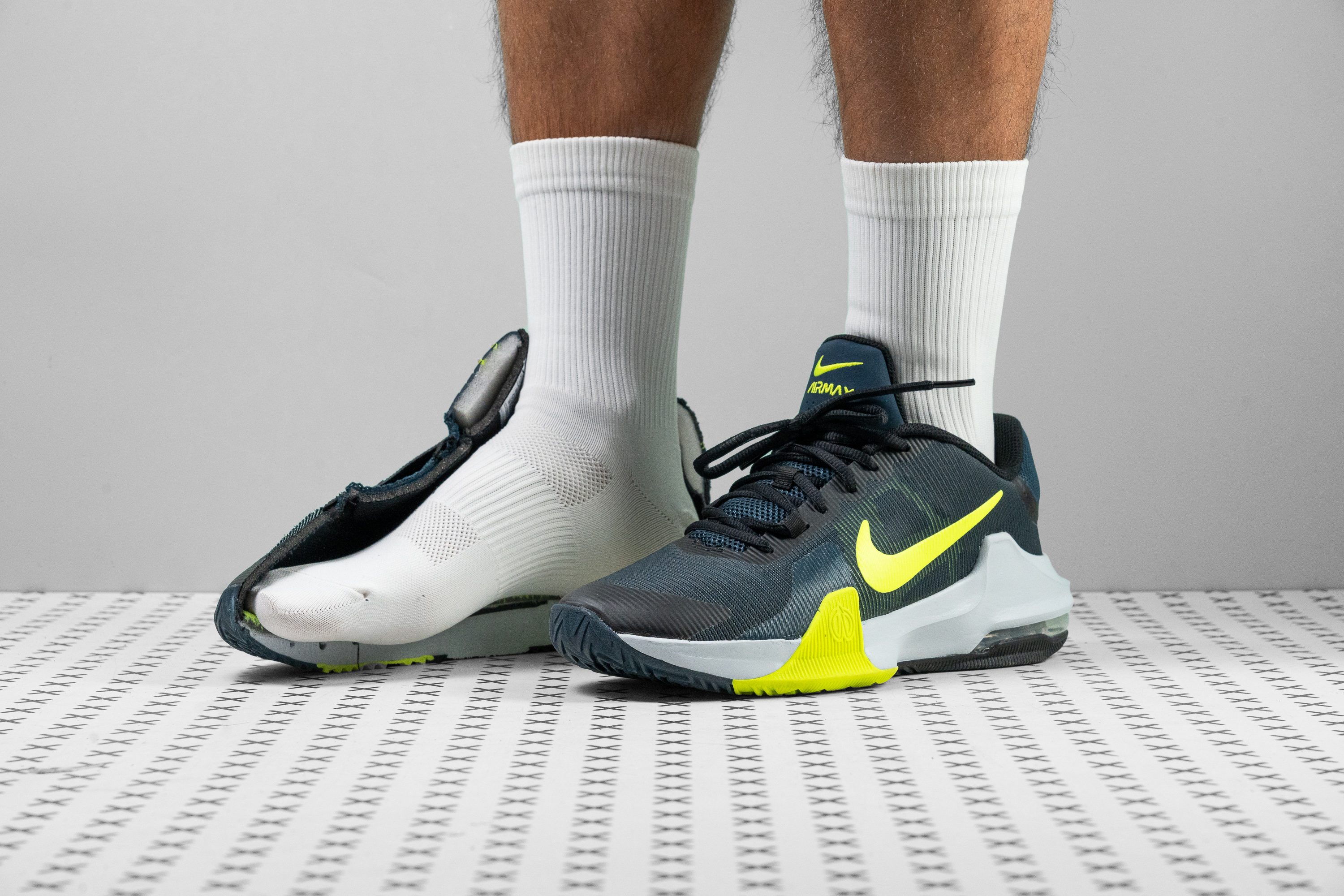


































What makes it the best?
It was the amazing hardness of the sole that made the Nike Air Max Impact 4 one of the favorites for outdoor play. Then we have the firmness of the midsole and upper breathability to thank for this shoe’s sustained agility on the court. But it was its $90 price, which is a lot lower than the $135 average, that convinced us that it’s the outdoor shoe that offers the most value for money.
We couldn’t believe our eyes when the HC durometer gave the outsole an 87.5, making it significantly firmer than the average sole that gets a score of only 81.5. Having such a sturdy sole allowed the shoe to withstand the unique pressures of the outdoor courts.
The midsole of the Air Max Impact 4 is arguably one of the most balanced cushioning systems ever. The HA durometer pegged the softness at 25.5, while the average is 26.6. This close-to-the-average firmness allowed us to be quicker on our feet without jeopardizing impact protection.
The breathability of the upper was felt the moment we put on this shoe. We confirmed this when the shoe got a solid 3 out of 5 after we conducted a smoke test on it in the lab.
The width of the footbed is no better than average: 101.1 mm (the average is 101.0 mm). Hence, we can never recommend this shoe to players who have wider-than-usual feet.
Pros
- Traction is consistently good
- Responsive cushioning
- Decent impact protection
- Comfortable and well-ventilated upper
- Dependable foot containment
- Great for outdoor use
- Value for money
Cons
- Needs to be broken in
- Not for wide-footers
5 qualities of the ideal outdoor basketball shoe
A vast majority of basketball shoes are designed with smooth indoor courts in mind.
But because outdoor courts are often more readily available for spontaneous games in public parks and community spaces, there is a considerable demand for shoes that can handle rough surfaces.
If you are on the lookout for a streetball-ready shoe, make sure that it checks the following five boxes:
- Hard, durable, and thick rubber outsole
- Thick tread pattern
- Sufficient cushioning and impact protection
- Durable and reinforced upper
- Good breathability
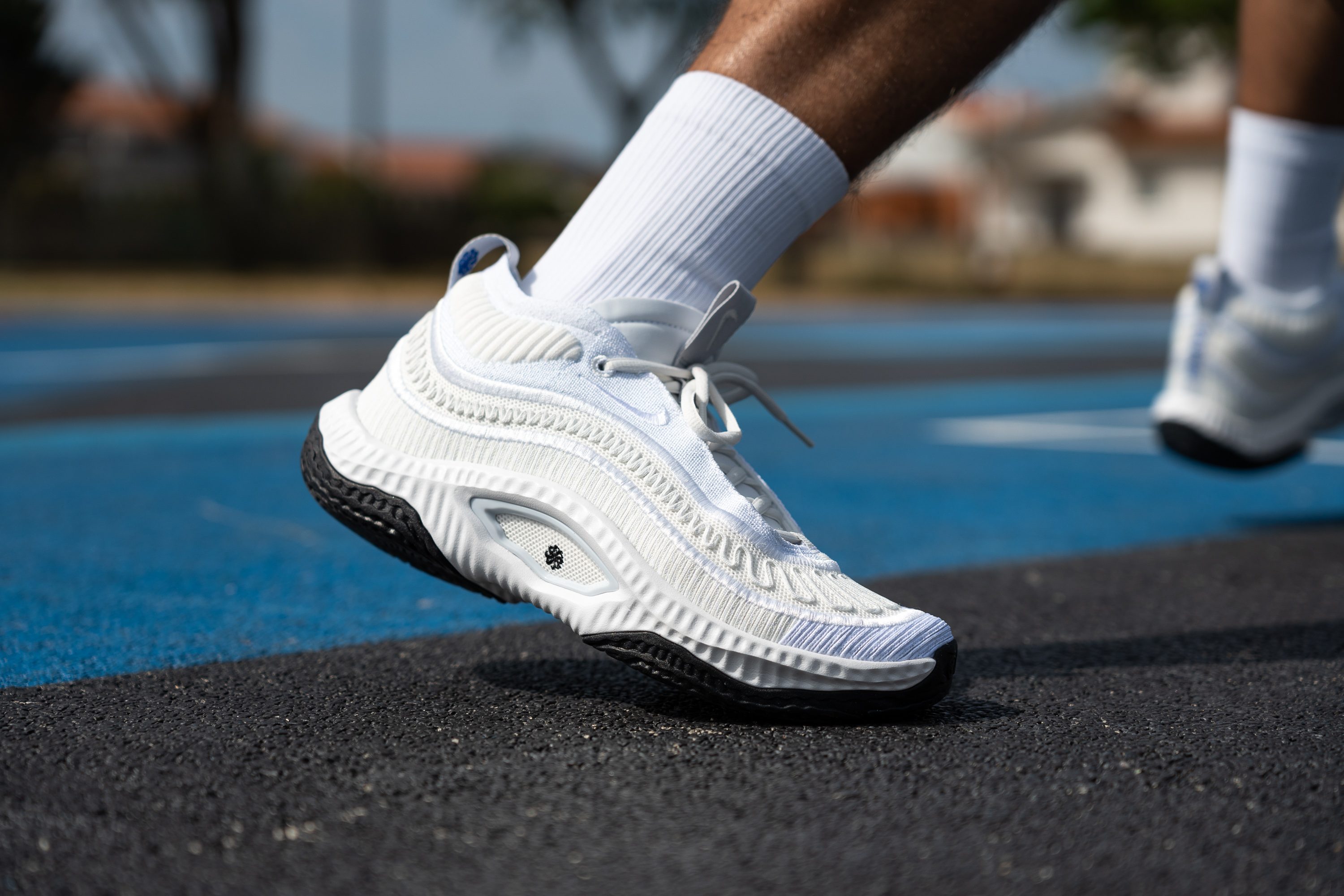
Choose hard, durable, and thick rubber outsoles for the blacktop
Hard outdoor courts will almost always put more miles on your shoes but different surfaces can have varying effects on your basketball shoes:
- concrete and asphalt are the harshest and most abrasive ones
- rubberized courts are more forgiving
- artificial turf is not very common but is the least demanding on shoes
Thus, the type of rubber used in the shoe’s outsole is a critical consideration.
In our lab, we perform 2 tests with different tools to determine the essential characteristics of each shoe’s rubber outsole: abrasion resistance and thickness.
Abrasion resistance
We turn to a Dremel with a sandpaper tip to test how much damage the shoe’s rubber can sustain within 22 seconds. The speed of the tool is set to 10K RPM while the pressure remains at 3.2N.
After that, we measure the depth of the indentation with a tread gauge. It shows how much rubber the Dremel managed to burn through. The results typically range from 0.2 mm to 2.0 mm, where the smaller number represents better abrasion resistance.
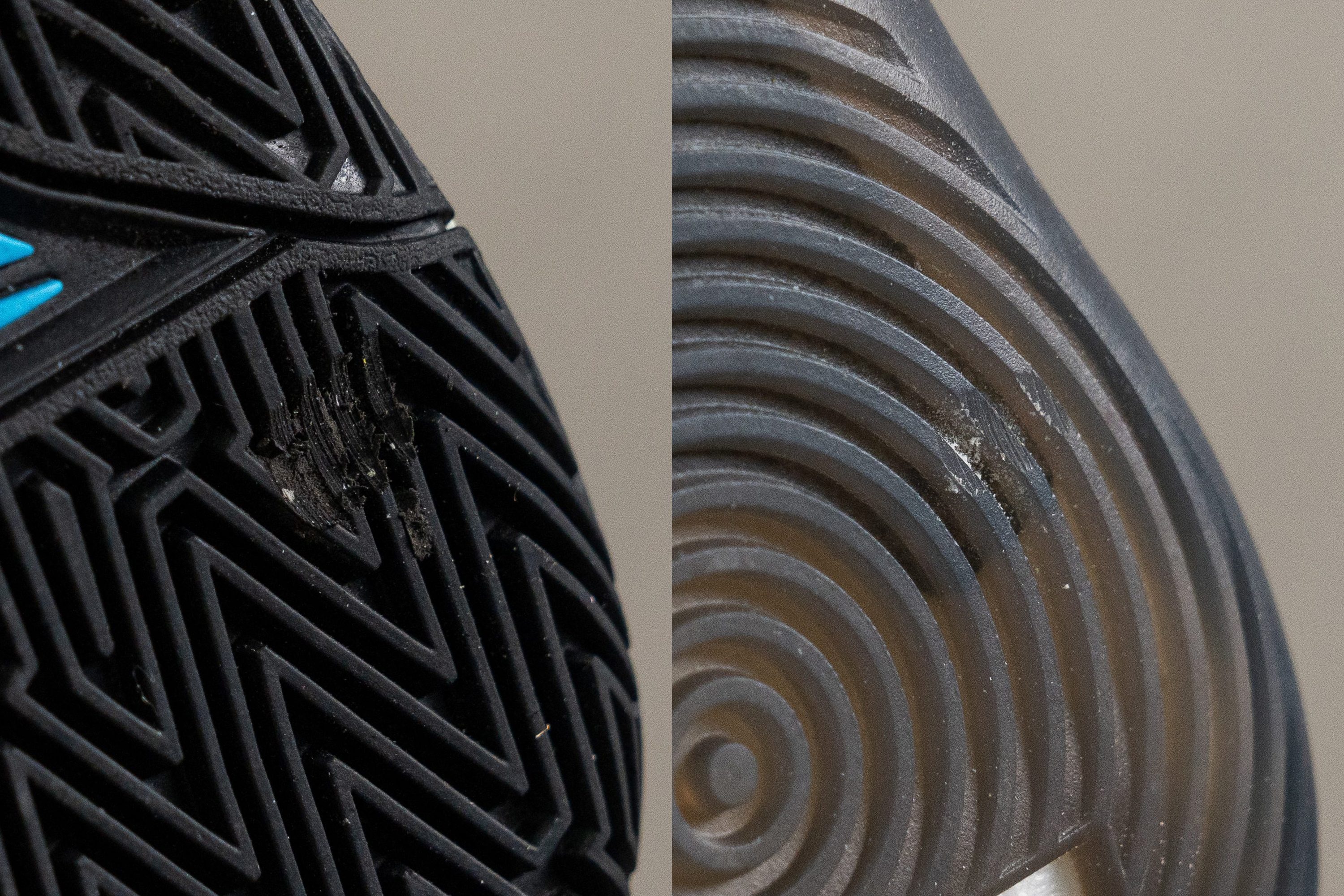
Outsole thickness
We want to make sure that the shoe's outsole rubber is thick enough because this directly affects the shoe’s lifespan.
We measure outsole thickness on half-cut shoes for higher accuracy of the caliper measurement. The results typically range from 3 to 6 mm, with an average of 4 mm.
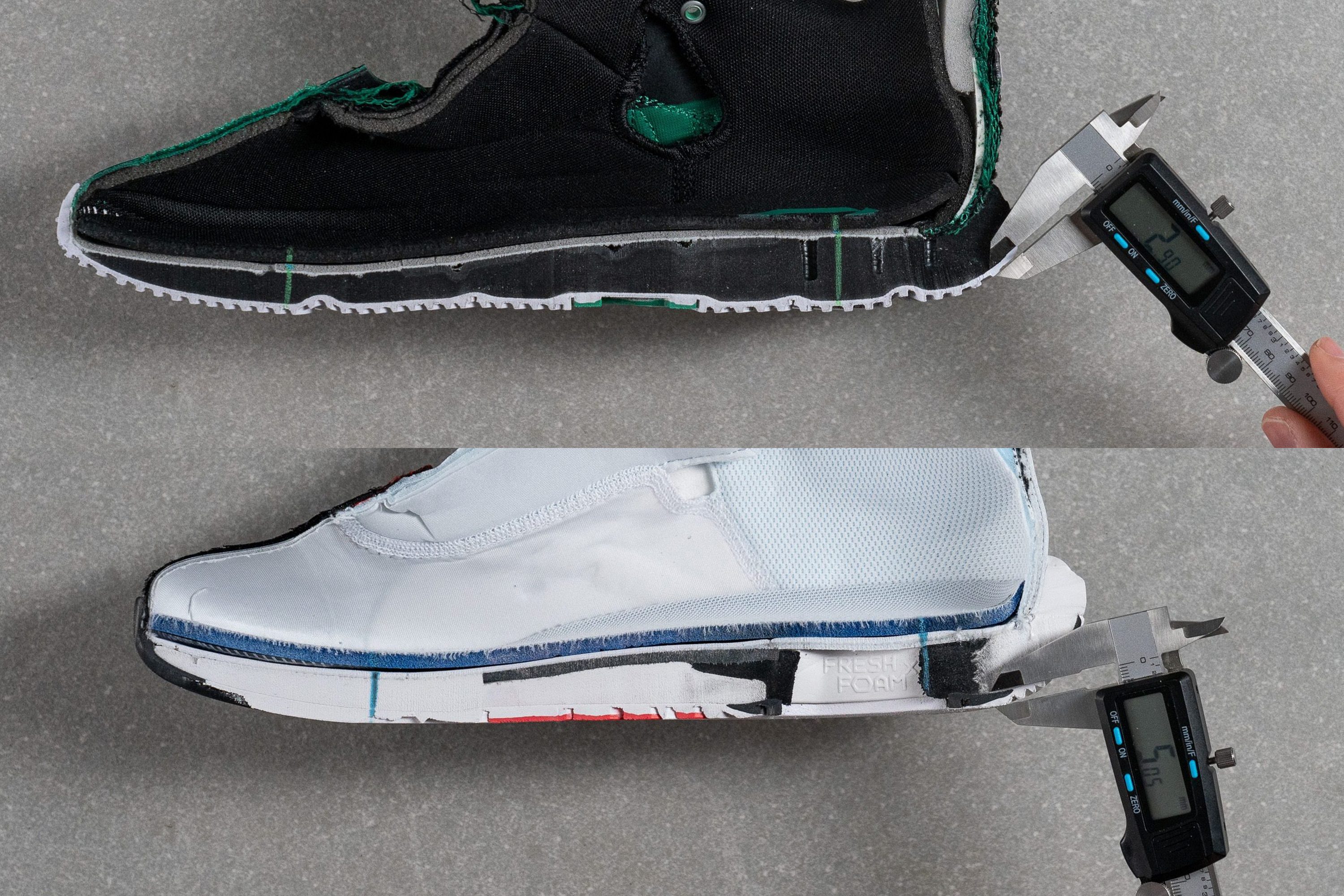
Putting all these measurements together, we can see which of our lab-tested basketball shoes live up to the durability criteria needed for the blacktop.
Tread pattern matters in outdoor basketball shoes
A good grip on the court means better control over your movements and the ability to jump higher. This is why the tread, traction, and grip of your basketball shoes are crucial.
But here's the thing: outdoor and indoor basketball shoes have different needs in this regard:
Indoor basketball shoes have thin razor-like tread lines that have a strong bite on hardwood but are instantly destroyed on concrete or asphalt. Some indoor shoes also feature circular flat spots on the sole that allow for a suction-like grip on smooth and flat surfaces. But take them outside and you may find them slipping and sliding all over asphalt, especially if the surface is not smooth.
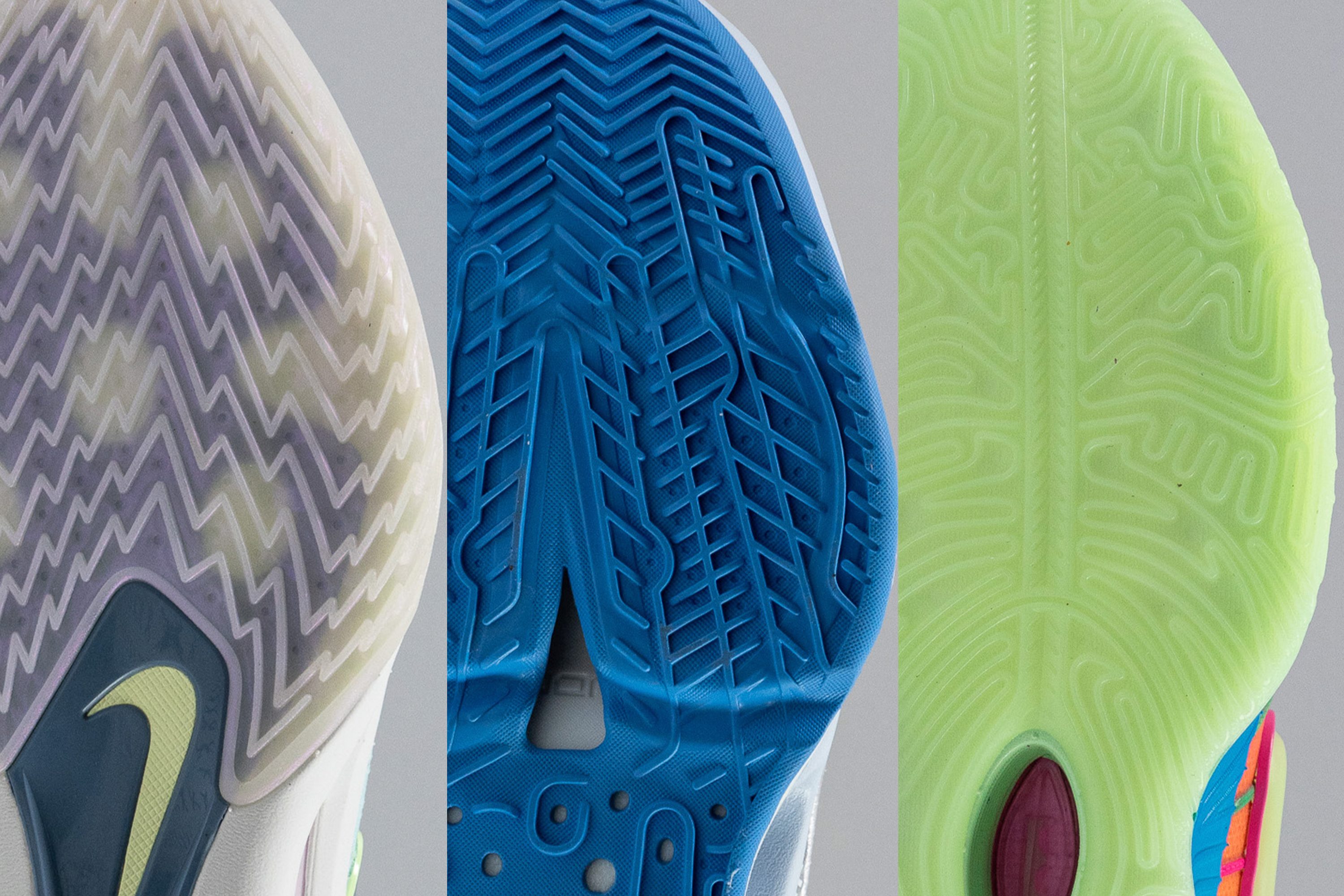
Outdoor basketball shoes typically come with larger thicker tread patterns that provide good lateral stability and grip on all types of surfaces.
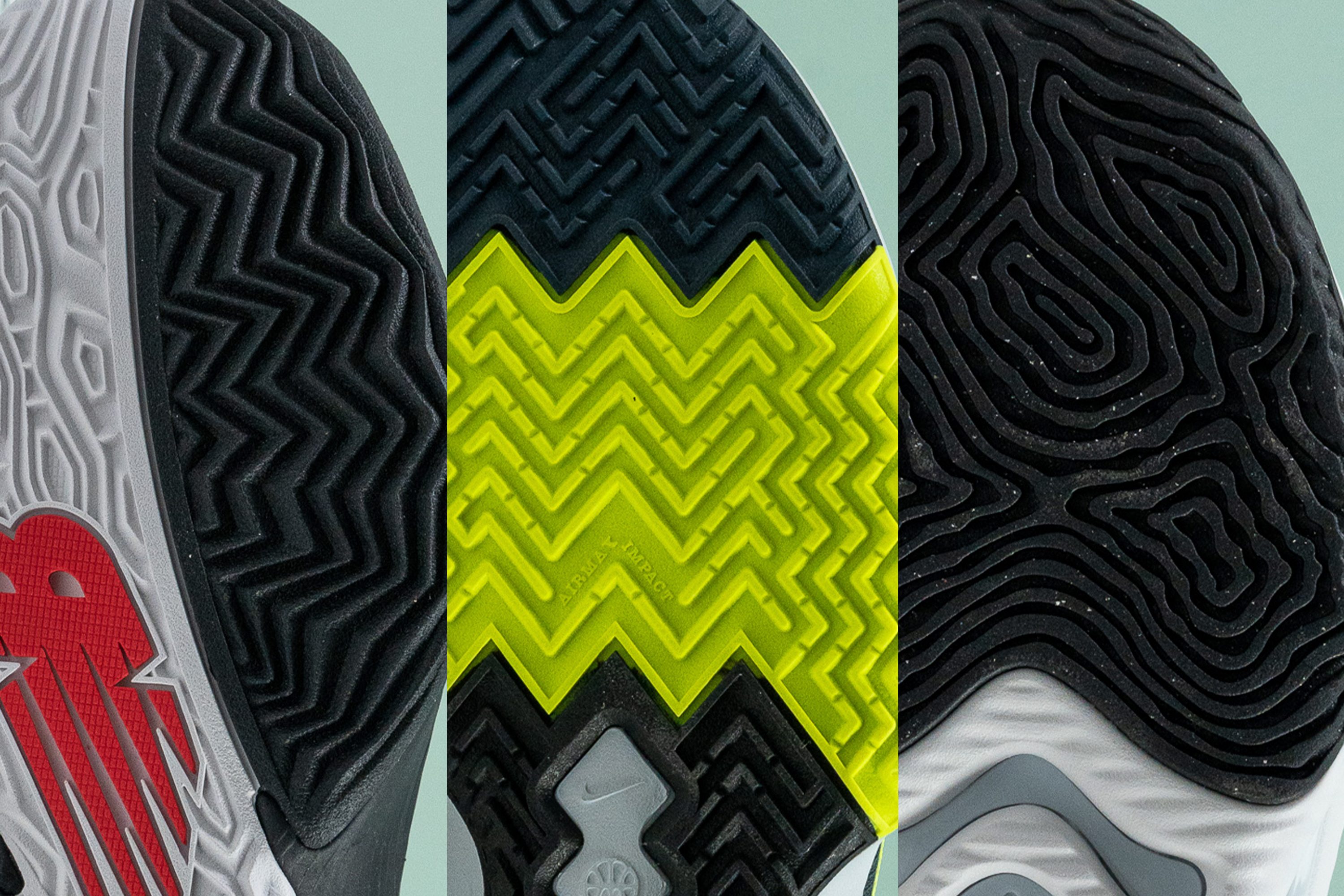
If you are in doubt about the treading on your pair of shoes, try this quick DIY test:
- When trying a shoe on foot, test the outsole by firmly pressing down against the floor.
- Try to slowly rock your foot back and forth and side to side. With most soft outsoles and thin tread lines, you are going to feel the rubber grooves warping and bending. You don't want that outdoors.
- You can further test it by running a bit, slamming the brakes (stopping to change direction), and stomping with your forefoot.
Outdoor hoop shoes with the best traction
We follow an acclaimed SATRA TM144 protocol to test the gripping capacity of each basketball shoe in our lab, whether it is an outdoor or an indoor option.
The grippiest shoes return the highest friction coefficients in the forefoot, where traction is most crucial in basketball. We look for a coefficient of at least 0.70 to claim the shoe's grip as reliable.
Sufficient cushioning and impact protection are essential
Concrete courts are much less reactive than wood or PVC courts, so if you’re aiming to play as hard as you would indoors, you should invest in a pair of well-cushioned shoes to protect from overloading injuries in the ankles and knees.
The findings of Zhou et al., 2023 suggest that players who habitually strike the ground with their rear foot may be at a higher risk of developing overuse injuries when running on hard surfaces such as concrete.
In basketball, most explosive movements involve a forefoot strike. These can occur while boxing out, jump shots, cutting, and finishing off two feet.
To make sure you’re fully covered for streetball, we meticulously check each shoe’s shock absorption in both the heel and the forefoot following the ASTM F1976 standard.
Depending on your individual needs, position, and playing style, you may want to go for a more pronounced ground feel or for more impact protection (higher SA measurements). But keep in mind that concrete and asphalt courts are going to be much harder on your feet and legs than indoor courts.
Midsole softness
Choosing how soft you want to go in a pair of streetball shoes is also entirely up to you. We are only here to measure cushioning softness on each pair with the help of a Shore A durometer.
To help you understand what each HA reading means in a real shoe, here are two videos illustrating cushioning foams on both sides of the spectrum:
Softer cushioning with a 20.1 HA reading
Firmer cushioning with a 33.3 HA reading
To give you an overview of cushioning in our best-rated basketball shoes for outdoor courts, we gathered the data on stack height and softness in the table below:
Consider upper materials too: are they durable enough?
Playing basketball outdoors WILL deteriorate your kicks faster than playing indoors. This is an important cost factor to keep in mind when considering the upper construction of your shoes.
But how do you know if the shoe’s toebox is reinforced enough to survive constant toe drags against the blacktop?
We are here to test that with our trusty Dremel.
Drilling each shoe’s toebox with sandpaper at a constant speed (5K RPM) and pressure (3.2N) for 12 seconds, we can assess the damage it caused to different types of uppers.
For example, a minor cosmetic scuff that doesn’t affect the shoe’s integrity gets a score of 5 whereas a see-through hole gets the lowest score of 1.
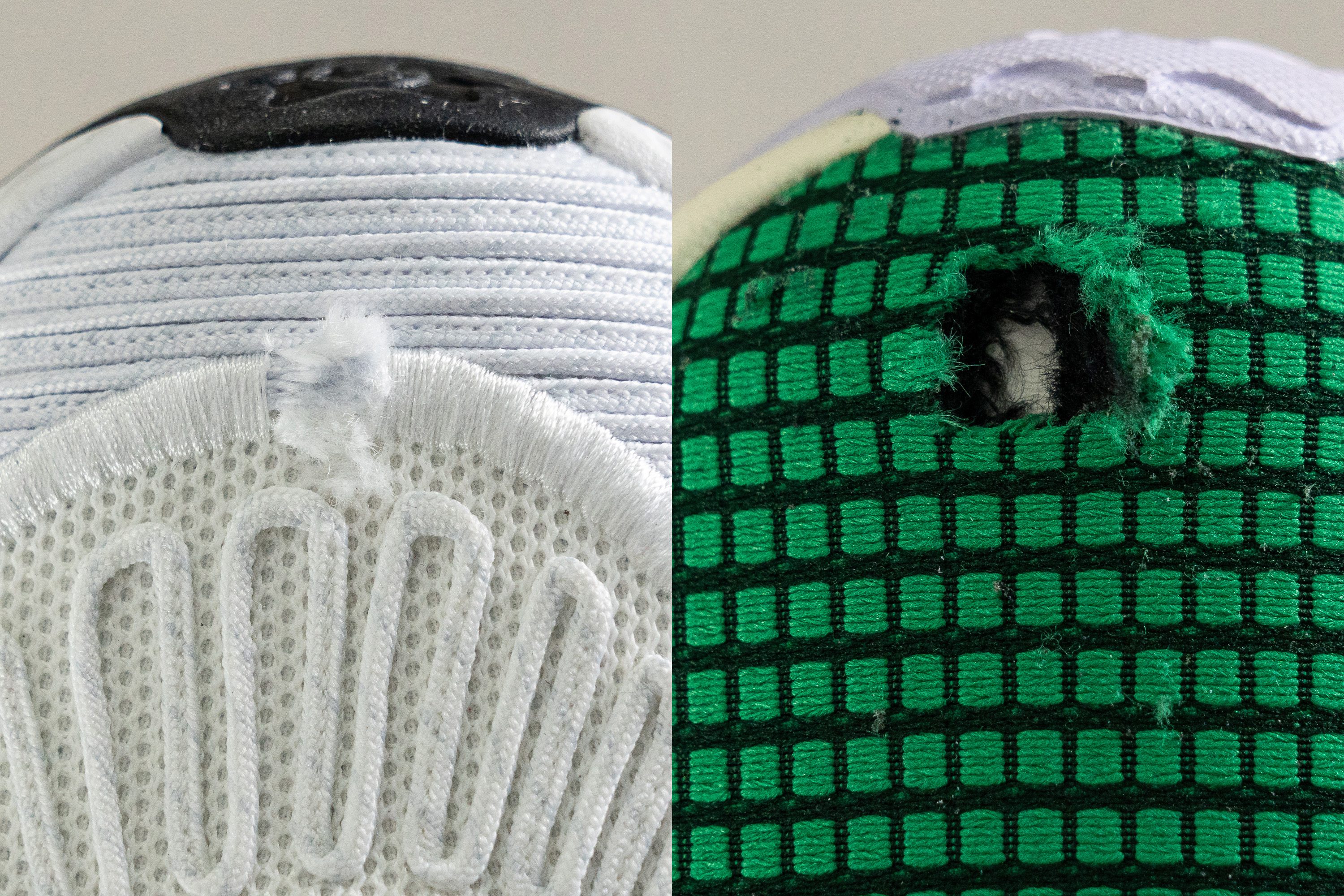
Here is the overview of outdoor basketball shoes with the most wear-resistant toebox materials:
Also do check the inner side of the shoe’s forefoot for any additional layers of protection against toe drags and slashes.
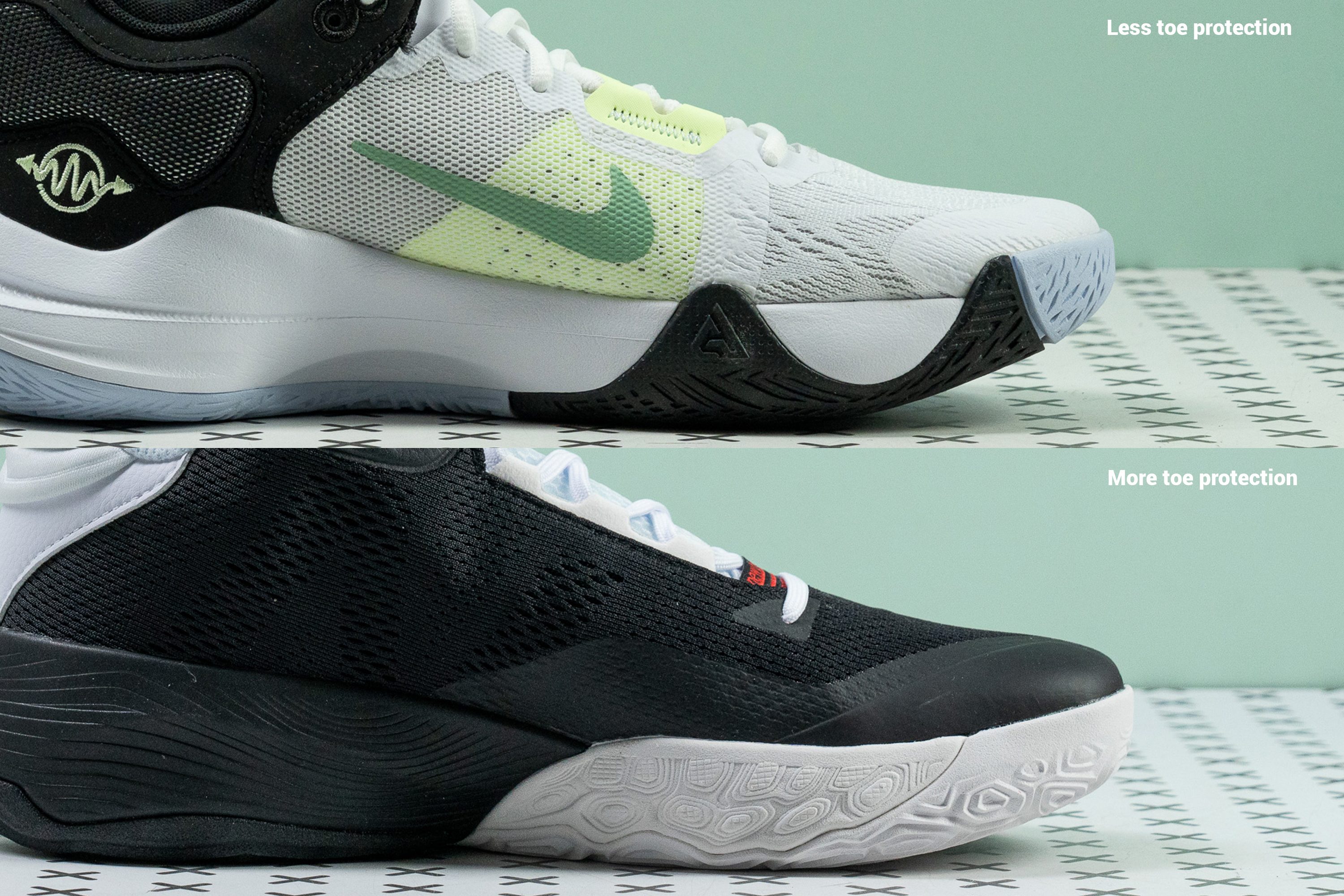
These days, synthetic, knit, and mesh materials are much more common among basketball shoes. That’s because they offer better breathability, lightness, and instant form-fitting comfort compared to old-school leather hoop shoes.
Of course, no one can stop you from getting genuine leather or suede uppers for outdoor courts as these can withstand rough use, providing excellent support and stability. But do keep in mind that the nature of streetball is so abrasive that you will find yourself splurging on this type of shoe more often than you may wish to.
Check breathability to avoid toasty feet in summer
Did you know that basketball was originally invented as a winter sport? It was meant as an indoor activity for the cold and rainy season. Maybe that explains why most hoop shoes these days lack breathability so badly???
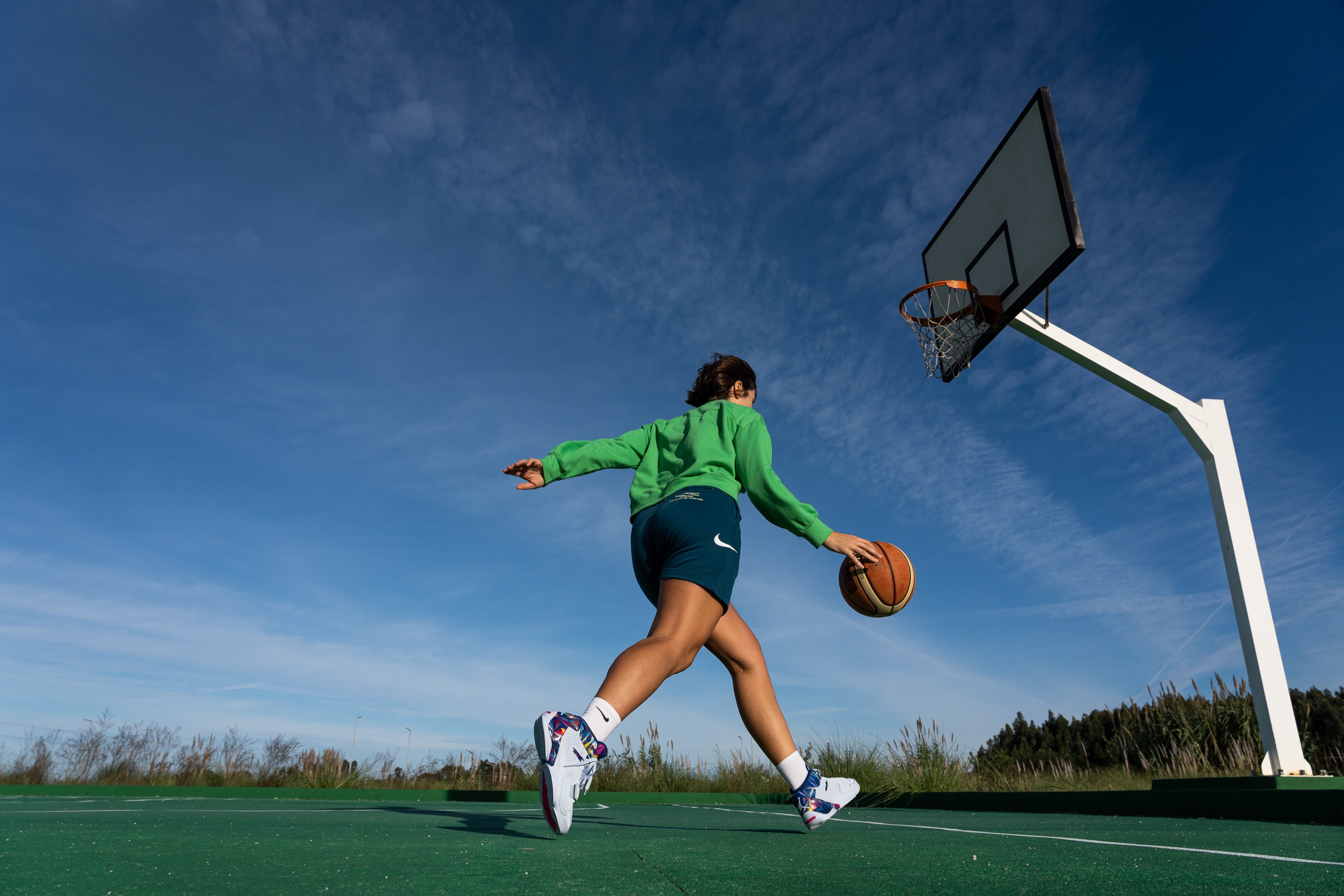
Anyway, the basketball scene has evolved quite a bit since 1898 and for Asian countries, for example, outdoor courts have become the most popular and readily available playground for basketball.
Considering the high temperatures and humidity of these areas, breathability becomes of utmost importance.
In our lab, we perform a series of breathability tests to check each shoe’s ventilation capacity. In one of these tests, we fill the upper with smoke and observe how quickly it passes through the upper material. We also take note of the areas that expel the smoke most effectively and happen to be most transparent in our light test.
We summarize our findings in a breathability score between 1 and 5 where 5 stands for the highest level of breathability we’ve come across in a hoop shoe.
Other factors to consider in outdoor basketball shoes
Ankle support and stability features
Look for shoes that provide adequate ankle support to minimize the risk of injuries. That doesn’t necessarily mean choosing high-top shoes!
Contrary to the common stereotype, a higher collar doesn’t give more ankle support according to science. Here is what does:
- high torsional rigidity
- wide base with a lateral outrigger
- stiff heel counter
- secure lockdown
- grounded platform
- solid traction
To learn more about basketball shoes with the best ankle support, see our guide.
Your playing style and personal needs
Even though basketball is becoming increasingly positionless, there are some features that guards may appreciate more than forwards and centers, and vice versa.
Guards
These athletes may benefit from a shoe with a lighter weight and more flexibility for faster movement and agility on the court.
You’ll want to look for low-profile cushioning to keep the shoe light and your movements liquid. It’s recommended to look for a more snug-fitting upper with additional features like a mid-foot strap or structured lacing systems so that you’re not worried about the foot moving inside the shoe.
Forwards
These highly versatile players shoot both from far away and close up, throw passes, perform rebounds, and take layups. Thus, they will also benefit from a basketball shoe that can do it all - grip, cushioning, and solid stability.
Centers
These players will benefit from maximum support and cushioning, as they often engage in more physical play under the basket.
When playing in front-court positions, regardless of outdoor or indoor your shoes are subject to additional wear and tear. As a player positioned in the paint during a basketball game, the constant need to box out and secure rebounds puts you at a higher risk of encountering moving feet and potential impacts, and setting picks will have smaller guards regularly colliding with you.
If what we’ve just described is your bread and butter on the court, it’s recommended that you look for a stiff upper construction with plenty of added ankle coverage to:
- Protect your feet
- Have your outdoor basketball shoes last a reasonable amount of time.
Famous centers: Nikola Jokic, Joel Embiid, Shaquille O’Neal
FAQs about outdoor basketball shoes
How much break-in time should I give my outdoor basketball shoes?
It really depends on the materials used in the shoe and how often you play in them. We try to give new basketball shoes at least 6 hours of light activity before playing a game in them.
This way you can get used to the shoe’s cushioning and response as well.
How much wear should I get out of outdoor basketball shoes?
Again, it depends a lot on game intensity, how much you drag your feet, and the conditions of the court you play on. Generally, you should get about 70 hours of playtime in with a solid outdoor pair.
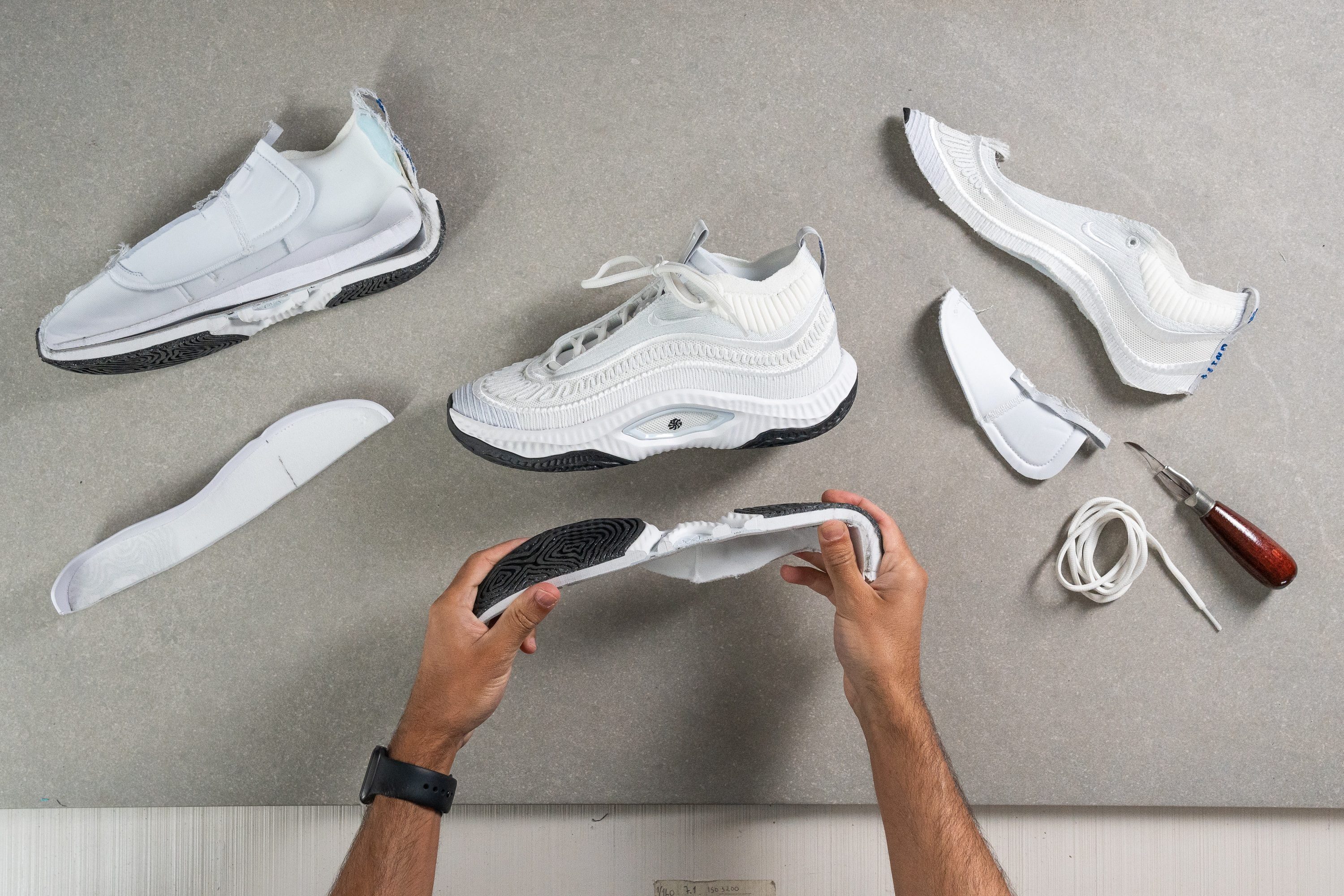
Are outdoor basketball shoes more expensive?
They are not! With both premium and affordable options available, you can choose a shoe within your budget.
But based on our personal experience, getting a $200 shoe just to play outdoors is not the best investment considering how quickly you burn through shoes on concrete and asphalt.
If you are a beginner who needs a solid outdoor shoe below $100, there are a few excellent options:

